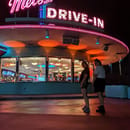Learning to cook is a part of life often learned in college out of necessity. Here are some tips and tricks we have learned from our (and other’s) mistakes:
Hot pans/pots/baking sheets DO NOT go on wood or plastic surfaces. While some surfaces like granite are safe to place hot items on, as a general rule, use a trivet or cooling rack if you aren’t going to leave your food on the stove or in the oven. Heck, in a pinch you can even use a towel.
DO NOT leave cooking food unattended. It’s too easy to walk into another room while your mac ’n’ cheese boils or your cookies bake, and this often leads to at least one, if not all, of the following:
- the food will burn or otherwise overcook
-
the fire alarm will go off
-
your dishes may be damaged
-
the smell of smoke will stick to your clothes, furniture, and walls
-
an actual fire will start
DO NOT PUT METAL IN THE MICROWAVE! Please, for the love of God, do not. Scientific explanation: metals contain so many electrons that the metal heats up extremely fast and could set fire to the entire appliance. Normal explanation: fire. Always double check if your plateware is microwave safe. Trust me.
Turn pot handles away from the front of the stove. This prevents the possibility of bumping into it and spilling your precious marinara sauce all over the kitchen. Also, a plus if you have children nearby, preventing them from being able to reach it.
Clean out your fridge AT LEAST every two weeks. Remember that leftover enchilada you saved from your roommates birthday party? Yeah, it’s become that unrecognizable pile of blue-grey fuzz sitting in a pool of slime. Just throw it out.
Make sure your fire extinguisher isn’t expired. Yes, they expire. The average fire extinguisher is good for around ten years, but when they expire, their reliability and effectivity drops. Always make sure you note the expiration date of your extinguishers.
In case you make a mistake and accidentally do start a fire, here is a short list of types of fires and ways to extinguish them:
- Wood, paper, cloth fires: extinguish with water or a fire extinguisher
-
Oil, alcohol, gas fires: NO WATER, extinguish with foam/powder fire extinguisher
-
Electrical fire: No water or foam extinguisher, these will conduct the electricity and spread the fire. Disconnect the electrical equipment and use a dry powder extinguisher.
-
Cooking oil or animal fat fires: NO WATER! Use a fire extinguisher.
For more information on types of fires and ways to extinguish them, visit this website.
All in all, the main tip here is clear: don’t die. Happy cooking, everyone.



